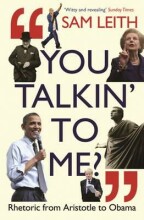Summary: You Talkin' To Me? : Rhetoric From Aristotle To Obama | 9781846683169 | Sam Leith
- This + 400k other summaries
- A unique study and practice tool
- Never study anything twice again
- Get the grades you hope for
- 100% sure, 100% understanding
Read the summary and the most important questions on You talkin' to me? : rhetoric from Aristotle to Obama | 9781846683169 | Sam Leith.
-
1 Introduction
This is a preview. There are 5 more flashcards available for chapter 1
Show more cards here -
What is the difference between rhetoric and philosophy?
Philosophy constitutes a set of methods for arriving at a distinterested understanding of the eternal truths of the world. In contrast: Rhetoric is directed at a practical goal; it's a means to an end
-
Where was rhetoric used first?
In law courts and the machinery of government.
-
What is epideictic rhetoric?
The rhetoric of praise and insult
-
What is judicial or forensic rhetoric?
the sort of rhetoric most commenly found in the courtroom
-
What is deliberative rhetoric?
to persuade the audience to take some action (future)
-
Why is there a strong tradition of hostility to rhetoric?
it is seen as the tool of demagogues and liars (distrust)
-
2 Rhetoric Then and Now
This is a preview. There are 14 more flashcards available for chapter 2
Show more cards here -
What is a knowledge economy?
a rhetoric economy; the value of the persuasive is huge in this economy (management books etc)
-
What is the most important human invention since the printing press?
internet: persuasive communication is now for everyone: through spoken word or through the written with a potential audience of millions.
-
First sign of rhetoric
Syracuse, Sicily, 2.500yrs ago: Corax had honed his persuasive arts as a courtier to the previous tyrant Hieron. (court)
-
It started in Sicily but continued in Athens (through Gorgias), why did rhetoric catch on so rapidly in Athens?
1) They were getting used to a radical and unprecedented experiment with democracy. The principle of persuasive speech was at the heart of government. It was a direct rather than a representative democracy. Membership of the demos (sovereign body) was taken on a one-man, one-vote basis. If you didn't turn up, you didn't have a voice.
2) In court with enormous juries it was impossible to get anywhere without being able to talk well.
- Higher grades + faster learning
- Never study anything twice
- 100% sure, 100% understanding






























